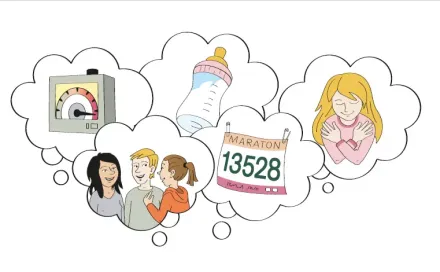
Patients in the driver’s seat! A multimethod partnership program on patient-driven innovations
The programme (PiF) operated between 2019-2024 in close cooperation with people with long-term illness and their family members as well as the healthcare providers that serve them.
Building on these partnerships, the programme was built on patient-driven innovations to promote self-care and co-care and studied their implementation into everyday health services and the daily life of patients. Read more about the learnings of the programme here!
Menu for this area
Patient-driven innovations studied in PiF

Genia
Genia is a mobile patient support system (mPSS) for young cystic fibrosis patients. It’s designed to establish patient, family and health care team partnerships, with an emphasis on placing the young person at the center of the decision-making process.

From Dream Catcher to Caring for Dreams
“Drömfångarprojektet” started in 2018. During the project, we realized that not everyone in healthcare shares the perception that healthcare meetings should, can, or even should be about dreams. Based on our experiences from “Drömfångaren”, we have now developed a website with the goal of facilitating an attitude shift towards “Caring for Dreams”.

From Patient Recovery Education to Worth Knowing
“What is good and helpful to know about psychiatry, as a patient or relative?” is the theme of the lecture series “Worth Knowing About Psychiatry and Recovery”. The clinic’s user influence coordinator (BISAM) has developed content and structure based on requests and development proposals from participants in the Patient School, which is now taking a new form.

Lead Patients
The Lead Patients innovation aims to support those patients wishing to take a substantial role in advancing their own and others’ self-care and demonstrate to health care and society what some patients are capable of. This is a social innovation that targets improvements in health systems by enabling substantial contributions from patients and informal caregivers.

Care Maps
The Care Maps aims to identify and strengthen social relationships relevant to life-changing events. The use of a Care Map may also facilitate care planning, coordination and communication between stakeholders and contribute to the identification of potentially lacking or unnecessary resources.
News Archive
 Photo: N/A
Photo: N/AHow mHealth platforms can provide pro-active and patient-driven follow-up care: a case study from Sweden
Data Saves Lives writes about how the Cystic Fibrosis community in Sweden partnered with academics and technology developers to create an app to track symptoms and the impact of treatment to support better clinical care.
 Photo: Ulf Sirborn
Photo: Ulf SirbornNew study examines the attitudes of healthcare professionals regarding Lead patients
Therese Scott Duncan, postdoc at the Department of Learning, Informatics, Management and Ethics, has investigated how Lead Patients self-care has been received by healthcare professionals. The article ”Empowered patients and informal caregivers as partners? A survey study of healthcare professionals’ perceptions”, is published in BMC Health Services Research.
 Photo: N/A
Photo: N/ANew publication from the Patients in the driver's seat: Lead patients' experiences of the COVID-19 pandemic
In a recently published study in BMJ Open, the authors investigate how the engagement and experiences of Lead patients were during the early Covid-19 pandemic. Lead patients can be defined as patients or relatives who use their experiences and knowledge to improve their own or their relatives' care situation and/or healthcare.
 Photo: Getty Images
Photo: Getty ImagesNew study from PiF shows that learning networks play an important role
In a recently published study from the Patients in the driver's seat research program at Karolinska Institutet, the authors examine the role networks can play for the chronically ill in a societal crisis like the COVID-19 pandemic.
 Photo: Getty Images,Getty Images/iStockphoto
Photo: Getty Images,Getty Images/iStockphotoPublication about Lead Patients self care
On November 16, 2022, a new study on Lead Patients was published: "Meeting the Burden of Self-management: Qualitative Study Investigating the Empowering Behaviors of Patients and Informal Caregivers" in the Journal of Participatory Medicine. One of the co-authors, who is also a Lead Patient and researcher in Patients in the driver's seat, Sara Riggare, is here interviewed about the study.
